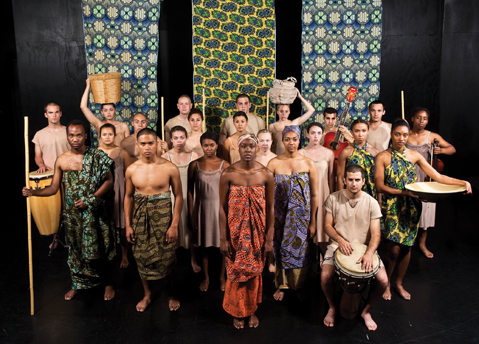
When playwright Ama Ata Aidoo stands to acknowledge the applause and begin her talkback session after Friday night’s performance of Anowa, the play she wrote more than 40 years ago while a graduate fellow in creative writing at Stanford, her career will have come full circle in several important ways. In 1965, with her first work, The Dilemma of a Ghost, a very young Aidoo became one of the first African women to publish a play in English. With success in her native Ghana came further opportunities, and when she arrived in Palo Alto a few years later, the United States was still rocking with the impact of the civil rights, anti-war, and feminist movements that had come into existence during the 1960s. At that point, Aidoo had already written Ghost, a play about the complex network of ideas and feelings flowing back and forth between America and Africa at the time, but with Anowa, her next work, she became a part of the movement and a pivotal figure in the transformation of African diaspora culture. With this weekend’s production of Anowa at UCSB, and the accompanying academic conference on her work, Aidoo and Anowa will get a 21st-century California audience, and UCSB will give this now-canonical African author a chance to reconnect with the American region in which her literary talent first reached maturity.
As with many of Aidoo’s works, the story for Anowa comes from Fante oral tradition but is refracted through her critical intelligence, her knowledge of the Western dramatic canon, and her cosmopolitan sensibility. The lead character, Anowa, is a beautiful young woman who has refused every suitor whom her parents have proposed, only to marry a mysterious stranger, Kofi Ako. And that’s where the heartache — and the play — begin. These two, despite their initial mutual attraction, are poorly suited. Anowa and Kofi Ako find themselves in constant conflict, yet unable or unwilling to divorce. When her husband begins buying slaves to staff his fur-trading business, Anowa denounces him and by extension the morality of her country, yet she still refuses to leave either one. At this point in the folktale, Kofi Ako reveals himself to be a devil in disguise, but in the play, he remains a human being, albeit a slave-owner. Thus, in addition to dramatizing the severe limitations imposed on women’s expression in traditional Ghanaian society, Anowa provides an unusual and important perspective on the slave trade, portraying its corrupting influence within Africa and exclusively among people of color.
When I spoke with director Irwin Appel and conference organizer Christina McMahon last week about the upcoming events, they agreed that this project represents the culmination of a long-standing commitment at UCSB to engaging in a global approach to understanding theater and performance. For Appel, who at this time last year was buried equally deep in directing an award-winning production of Hamlet, directing Anowa has meant going outside of his personal frame of reference and taking on a distinctly new kind of challenge. For McMahon, nearly the opposite is true. McMahon holds an assistant professorship in the UCSB Department of Theater and Dance, and she has been the driving force behind this project, as well as the central node in a large network of people who helped make it happen.
Casting the 24 actors required to stage a full production of Anowa at UCSB was a challenge. The solution, according to Appel, was “to accept that the show would be done by a multicultural ensemble, and to take the risk that the play is worth doing even if we can’t do it the way it might be done in Ghana.” But the cast is also the production’s strongest suit in its bid for support from the playwright. The goal of the production is first and foremost “to honor Ama Ata Aidoo,” said Appel. “I believe that our cast will capture the beautiful poetry of her script,” he continued. “Anowa is a young, iconoclastic, and ultimately tragic figure, and that will have resonance for our audience,” he said, adding with a smile, “In that sense, she’s not so very different from Hamlet!”
4•1•1
Anowa will play May 25-26 and May 31-June 2 at 8 p.m. and on June 2 at 2 p.m. at UCSB’s Hatlen Theater. For tickets and information call 893-7221 or visit theaterdance.ucsb.edu. For additional information about Ama Ata Aidoo’s stay at UCSB, visit ihc.ucsb.edu/aidooconference-2.
